No, it is not illegal to kill a praying mantis in the United States. Despite a common myth suggesting otherwise, there are no federal or state laws explicitly prohibiting the killing of praying mantises. However, these insects play a valuable role in ecosystems, and many experts advise against harming them.
Understanding the Myth About Praying Mantis Protection
The misconception that killing a praying mantis is illegal has persisted for decades. The origin of this myth is unclear but may stem from the insect’s unique appearance and behavior, which evoke respect and fascination. The idea that praying mantises are protected by law has become widespread, despite a lack of legal foundation.
Legal Status of Praying Mantises in the U.S.
1. No Federal Protection
The federal government does not classify praying mantises as protected or endangered species. They are not listed under the Endangered Species Act or any similar legislation.
2. State and Local Laws
- General Wildlife Laws: While praying mantises are not specifically protected, some states have general wildlife protection laws that may apply if a person destroys an insect habitat or causes unnecessary harm to native species.
- Agricultural Importance: In certain states, praying mantises are considered beneficial insects due to their role in pest control. As such, harming them may be discouraged but not explicitly illegal.
The Ecological Importance of Praying Mantises
Praying mantises are predatory insects that help control populations of pests such as aphids, flies, and caterpillars. Their presence benefits gardens, farms, and natural ecosystems, making them allies in sustainable agriculture. For this reason, many experts recommend preserving these insects rather than killing them.
Benefits of Praying Mantises:
- Pest Control: Mantises are natural predators that keep harmful insect populations in check.
- Biodiversity Support: By preying on various species, they contribute to a balanced ecosystem.
- Fascination and Education: Their unique hunting behavior and distinctive appearance make them valuable for educational purposes.
Why People May Kill Praying Mantises
1. Misunderstanding or Fear: Some individuals kill praying mantises out of fear or a lack of understanding of their ecological role.
2. Accidental Harm: Pesticides and habitat destruction often inadvertently harm praying mantises.
3. Cultural Practices: In some cultures, certain insects are regarded with superstition or negative connotations, leading to their deliberate killing.
Ethical and Practical Considerations
While killing a praying mantis is not illegal, it is generally discouraged due to the insect’s ecological importance. If a mantis becomes a nuisance or poses a perceived threat, consider the following alternatives:
- Relocation: Gently move the insect to a more suitable location.
- Natural Pest Management: Allow the mantis to remain as a natural predator in gardens or farms.
- Education: Learn about the benefits of mantises and share this knowledge to reduce unnecessary harm.
Related FAQs
Q1. Is it bad luck to kill a praying mantis?
Ans: This is a cultural belief with no basis in science. However, some cultures associate praying mantises with good fortune, and harming them may be considered disrespectful.
Q2. Are praying mantises endangered?
Ans: No, praying mantises are not classified as endangered in the U.S. or globally. They are relatively common and thrive in various habitats.
Q3. Do praying mantises bite humans?
Ans: Praying mantises are not aggressive toward humans and rarely bite. If they do, it is typically in self-defense and causes minimal harm.
Q4. Can praying mantises help in pest control?
Ans: Yes, they are effective predators that feed on common garden pests, making them valuable allies for farmers and gardeners.
Q5. Are there laws protecting other insects?
Ans: Yes, some insects, such as monarch butterflies and certain bee species, are protected under state or federal conservation laws due to declining populations or ecological importance.
Q6. What should I do if I find a praying mantis in my garden?
Ans: Consider leaving it alone, as it will likely help control pests. If necessary, gently relocate it to another area.
Conclusion
While it is not illegal to kill a praying mantis, doing so is generally unnecessary and discouraged due to their ecological benefits. These insects contribute to biodiversity and pest control, making them an asset to natural and agricultural environments. Instead of harming them, consider promoting awareness of their importance and fostering coexistence.

